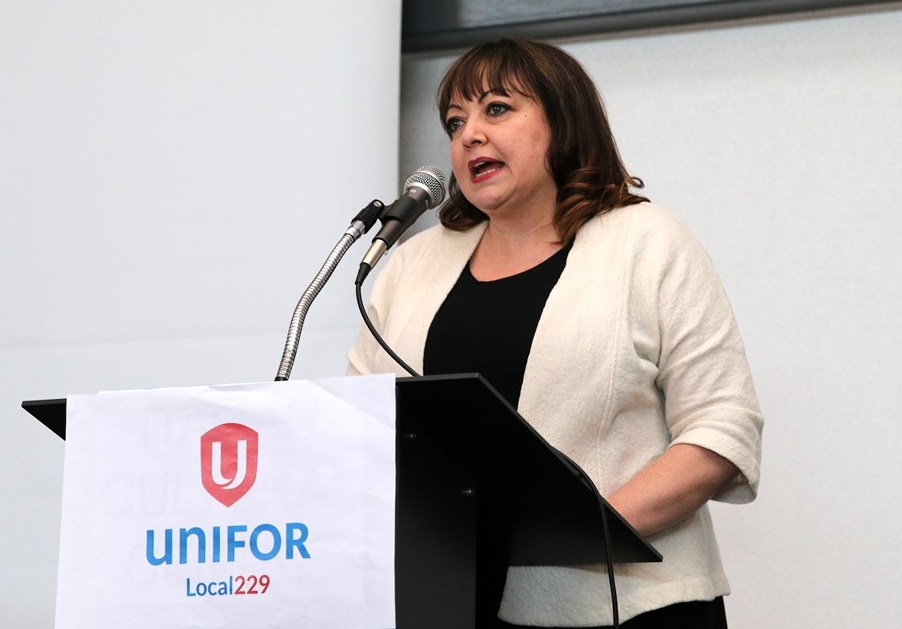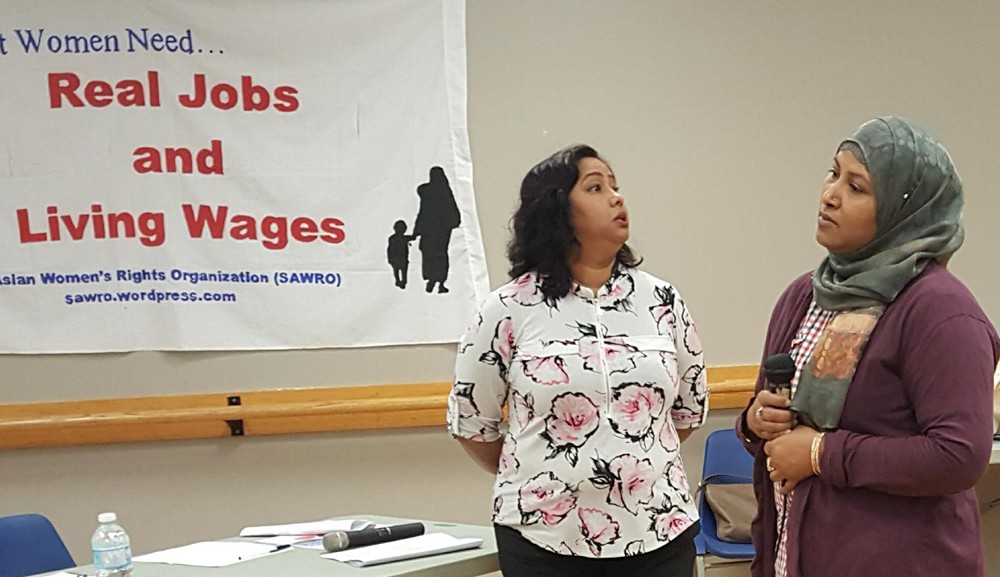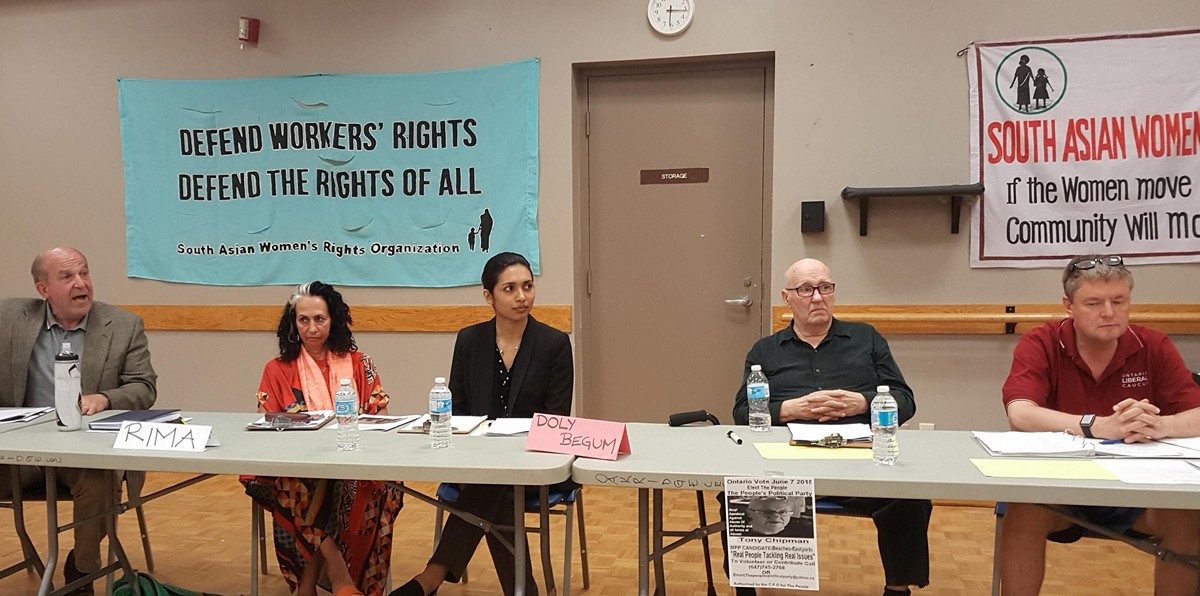|
June 5, 2018 - Vol. 7 No. 9
Speaking Out on Matters of Concern
Manufacturing Yes! Nation-Wrecking No!
- Pierre Chénier -
PDF

Speaking
Out
on
Matters
of
Concern
• Manufacturing Yes! Nation-Wrecking No! -
Pierre
Chénier
• Town Hall Meetings Put Workers' Concerns on
Agenda During Election
• East Danforth Immigrant Women Speak About
Their Concerns
• The Need to Properly Fund Hospitals and
Paramedic Services - Jason Fraser, Chair of CUPE Ambulance
Committee of Ontario
• Opposition to Privatization of Public
Services - Jack Jackson, President,
ATU Local 1572 (Mississauga)
• What Is Taking Place with Teachers'
Pensions? - Laura Chesnik, Independent Candidate in
Windsor-Tecumseh
Speaking Out on Matters of Concern:
Manufacturing Yes! Nation-Wrecking No!
- Pierre Chénier -

United Steelworkers Local 1005 from Stelco in Hamilton at day of action
against closing of Caterpillar EMD plant, January 21, 2012.
Manufacturing
in
Ontario
has suffered a serious setback over the last 18 years. In
the year 2000, direct manufacturing employment represented over one
million jobs. In 2015, instead of growing along with the population,
the number of manufacturing workers had fallen to 743,000.
The
wrecking
of
Ontario manufacturing is reflected in a fall in wages.
Between 2000 and 2015, the earnings of the middle or median worker in
the Ontario economy fell by 4 per cent after inflation. The fall of 4
per cent in the median real wages or individual reproduced-value of the
working class, which was the greatest reduction in real wages of any
province over the period, can be attributed to the loss of better
paying manufacturing jobs and greater competition for the remaining
jobs. (From research compiled by the University of BC and the C.D. Howe
Institute)
The
closure
of
manufacturing plants employing hundreds of workers, often in
cities and towns where the factory was the biggest employer, was
widespread across Ontario. Examples of this abound:
U.S.-based
heavy
machinery
producer Caterpillar closed its Electro-Motive Diesel
(EMD) plant in London in 2012 and the Lovat tunnel-boring machine (TBM)
facility in Toronto in early 2014, depriving hundreds of workers and
people in those communities of their livelihood.
U.S.
food
monopoly
Heinz in 2014 shut down its Leamington plant, which was
by far the biggest employer in town. The shutdown deprived 740 workers
of their jobs and put downward pressure on the income of hundreds of
farmers supplying tomatoes to the plant.
Siemens
Canada,
a
subsidiary of the German Siemens multi-manufacturing
oligopoly, announced on July 18, 2017 the closure of its wind-turbine
plant in Tillsonburg slashing over 340 jobs and shuttering one of the
town's largest employers.
The
Campbell
Soup
Company announced this past January its plan to stop soup
production in Canada within the next 18 months. The closure of its last
Canadian manufacturing facility, located in Etobicoke, Ontario will put
380 workers out of work.
The
list
includes
the wrecking of basic steel production, such as at Stelco
which is now a shadow of its former self. A modern economy cannot exist
in any self-reliant way without the production of its own steel.
The
issue
boils
down to who controls the economy and for what aim. The
working class constituted as the nation must assume control of the
economy and replace the aim of maximum profit for private supranational
interests with an aim of nation-building to serve the people and the
harmonious extended reproduction of their economy. This aim requires a
new direction for the economy towards self-reliance and diversity
within all the regions of the country. Modern manufacturing acts as the
anchor or economic base of the regions such as southern and northern
Ontario within an overall economy that includes resource extraction,
public services, social programs and international trade based on
cooperation and mutual benefit.
Manufacturing Yes! Nation-Wrecking No!
is a demand of Ontarians to empower themselves now! With empowerment
now! comes control over those affairs that directly affect the people’s
lives, and at the heart of the people’s lives is the economy on which
everyone depends.

Town Hall Meetings Put Workers' Concerns
on Agenda During Election
Working people across Ontario are fighting every day for
their rights and pressing that their demands be met. During the
election, more than ever, they are holding meetings, town halls, round
tables and other activities to ensure they have an independent voice in
the election and argue out how to intervene to make sure their concerns
are heard.
Peterborough Action
Against Poverty Town Hall
Thirty people participated in an
Action Against Poverty town hall meeting with local candidates
organized by the Youth Political Action Coalition in Peterborough on
May 24.
Jane-Finch Neighbourhood Community Meeting in Toronto

A meeting at the Driftwood Community
Centre, May 29, organized by the Jane Finch Toronto Strong
Neighbourhoods Task Force, provided a forum for residents and community
groups to highlight issues of concern. In
particular the discussion focussed on; public housing, in particular
the state of and recent closures of Toronto Community Housing
buildings; education; mental health care; workers rights
and the minimum wage; and public transit.
Town Hall in Thunder Bay Concerning Long-Term Care
Crisis
 
A Long-Term Care Crisis Town Hall Meeting was organized
May 29, in Thunder Bay by Unifor Local 229. The union represents long
term
care workers in the city which has six
long-term care facilities.
According to the president of Unifor Local 229 Keri
Jefford, there
remains a chronic shortage of personal support workers. "Some of the
issues is legislation changes to make
employers and owners of for-profit and private clinics have basic
minimum staffing levels and funding also needs to increase and workers
need more time with the residents," Jefford said.
Natalie Mehra, Executive Director of the Ontario Health Coalition, also
spoke during the meeting saying that staffing shortages is an issue
impacting long-term care homes across the
province.
During the town hall meeting, several solutions were
offered by
staff at long-term care homes in the city and family members of
residents, which included not opening anymore
for-profit or private homes, increasing the worker to patient ratio,
and
wage increases to incentivize more people into the profession.
Gender Equity Town Hall in Toronto

A gender equity town hall candidates meeting was
organized in
Toronto on May 29, as part of the "Ontario for All" campaign
being organized by various non-profit organizations
including food banks, community health centres, legal clinics, and
youth services, during the election. Discussion at the meeting dealt
with questions of safe and affordable housing,
affordable child care, and ending gender-based violence.

East Danforth Immigrant Women Speak
About Their Concerns

Immigrant women activists living in Toronto's East
Danforth area
organized an election forum on May 26 to inform communities in the
Scarborough South West and Beaches-East
York ridings of issues of concern to them in the
Ontario election. The forum, in which some 100 people participated, was
organized by members of the South Asian Women's
Rights Organization and Unifor East Danforth Community Chapter.
 The women described
extensive labour market challenges as an
election issue. Candidates were invited to join a "listening panel" to
hear about work-related problems and the proposals
immigrant women have discussed to solve them. Six of the candidates
running in the two ridings participated. The women described
extensive labour market challenges as an
election issue. Candidates were invited to join a "listening panel" to
hear about work-related problems and the proposals
immigrant women have discussed to solve them. Six of the candidates
running in the two ridings participated.
Two young women led off with a presentation about an
investigation
community women leaders recently carried out into the marginalization
of immigrant women workers. They also
outlined a set of proposals for labour market reforms worked out by
community women: an inquiry into the underemployment of skilled
immigrant women; third party representation for
non-unionized workers; action to end chaotic work scheduling;
restriction of the operations of temporary help agencies and equitable
access to Employment Insurance, child care subsidies
and other work-related social programs.
Interventions by three groups of women followed. They
discussed
their own experience with each of the reform themes and put forward
questions for the candidates who were given an
opportunity to respond. Lively discussion took place thanks to the
initiatives the immigrant women are taking and their determination to
provide the problems they face with viable
solutions.
 

(Version
française
de
cet
article)

The Need to Properly Fund Hospitals
and Paramedic Services
- Jason Fraser, Chair of CUPE Ambulance
Committee of Ontario -

Paramedics from many Ontario cities
converged on Queen's Park December 12, 2017, to oppose dangerous
changes to the Ambulance
Act made as part of the massive omnibus Bill 160
passed that day.
We want whichever of the political parties is
elected to
take a look
at the services that Ontario paramedics provide and realize that they
need to invest in paramedic services right away.
They must take an overall look at health care and
properly fund hospitals so that appropriate bed allocations are made to
alleviate the pressures on hospitals and paramedic services. If
hospitals are not being properly funded and are not receiving the
appropriate bed allocations, emergency departments get backlogged with
patients who should potentially be admitted to one of the floors. If no
bed is available on the floor, the patient gets held up in the
emergency department occupying one of its beds. When paramedics arrive
with a patient on an ambulance stretcher, there is no available bed to
move that patient over to.
Proper funding is needed throughout an entire hospital
to allow proper
patient flow within the hospital as well as patient flow from paramedic
services into the hospital system. As paramedic services' call volume
is increasing dramatically, they are in need of
more funding in order to increase the capacity of paramedics working on
the road to transport patients in need of our assistance. Whether it is
Ontario, Quebec, or any other province, health
care must be funded appropriately so that the needs and demands of the
people are met.

Opposition to Privatization of Public Services
- Jack Jackson, President, ATU Local 1572
(Mississauga) -

Keep Transit Public rally at Queen's Park, May 8, 2018.
We are pushing to have public services kept in the
hands of the
public. In my case it is transit, in other cases it may be health care,
etc. It is not just the Amalgamated Transit
Unit (ATU) but all the unions are pushing it. There is the "We Own It
campaign" by the Ontario Public Service Employees Union as well.
What we are pushing for is that politicians at all
levels
understand and support the keeping of public services in the hands of
the public. We saw a little bit of movement with respect to
Toronto recently. The Toronto City Council passed a motion which
declares that transit in the municipality remains public and must
continue to be operated and maintained by the Toronto
Transit Commission. That is only half of a gain because at the end of
the day there is the high likelihood that Metrolinx or the province may
respond by saying, "You you can operate it but
you still have to fund it, maintain it, design it and build it" which
obviously they are not in a position to do. This is a small move, but
it is truly one day at the time. The Keep Transit
Public campaign had an influence on City Council passing the resolution.
A while back we held a rally at Union Station in
Toronto which is a
big transit hub. Since we did that, we got some media attention, we
started to see politicians coming around.
Municipally, councillors wanted to start talking. Now the Mayor is
paying attention, now the NDP. We believe it is building steam.
Does it have enough steam for the provincial election?
We will find
out. We are not done after that. We still have the municipal and
federal elections. Our work is not directed solely
towards this campaign, it is about the issue of privatization in
general. We are trying to address this in a manner that is about public
services. We know that governments do not stop at one
spot. There is not a single example where privatization works, whether
it is Highway 407 or Hydro. It is about raising awareness on the need
to keep public services in the hands of the
public.

What Is Taking Place with Teachers' Pensions?
- Laura Chesnik, Independent Candidate in
Windsor-Tecumseh -
In conversations with teachers during this election
campaign a
question that keeps coming up is what the government is up to with our
pension plans.
 Since 2016, Ontario's
Auditor General Bonnie Lysyk, an officer of
the Legislature, has been raising the alarm about the government's
accounting practices. In her pre-election review of
its financial projections she noted that the government is forecasting
revenues from the Ontario Teachers' Pension Plan and insufficient
pension expense for the Ontario Public Service
Employees' Union Pension Plan. Our pension funds however are not a
government asset. They belong to us. According to Lysyk the pensions
are not a "true asset" because the government
does not have the unilateral legal right to withdraw funds from the
plans or reduce future minimum contributions to the plans without the
express agreement of the plans' joint
sponsors. Since 2016, Ontario's
Auditor General Bonnie Lysyk, an officer of
the Legislature, has been raising the alarm about the government's
accounting practices. In her pre-election review of
its financial projections she noted that the government is forecasting
revenues from the Ontario Teachers' Pension Plan and insufficient
pension expense for the Ontario Public Service
Employees' Union Pension Plan. Our pension funds however are not a
government asset. They belong to us. According to Lysyk the pensions
are not a "true asset" because the government
does not have the unilateral legal right to withdraw funds from the
plans or reduce future minimum contributions to the plans without the
express agreement of the plans' joint
sponsors.
The sponsors of the Ontario Teachers' Pension Plan are
the Ontario
Teachers' Federation (OTF) and the Ontario government. Each appoint
five members to the plan's Board and,
together, they select the chair. Each Board member is appointed for a
two-year term and can serve for up to four consecutive terms.
The OTF is overseen by a Board of Governors made up of
10
representatives of each of the provincial teachers' unions in Ontario:
Association des enseignantes et des enseignants
franco-ontariens, Elementary Teachers' Federation of Ontario, Ontario
English Catholic Teachers' Association and the Ontario Secondary School
Teachers' Federation.
The government is forecasting that it will receive $3.4
billion in
revenue from the Ontario Teachers' Pension Plan over the three-year
period ending March 31, 2021. However, what it
labels "revenues" are not the government's to use. They belong to the
pension fund. The auditor general speaks of the government's accounting
method distorting the forecasted resources
available for its decision-makers to allocate in their fiscal planning.
It also distorts the fact that the government appears to be
unilaterally taking possession of our pension funds.
Lysyk goes on to note that after adjusting for the
overstatement of
revenue from the teachers' pension plan and the understatement of
expenses for the Ontario Public Service Pension
Plan, Ontario's annual deficit would be $11.7 billion for 2018/19 (or
75 per cent more than the reported $6.7 billion), $12.2 billion for
2019/20 (or
85 per cent more than the reported $6.6 billion) and
$12.5 billion for 2020/21 (or 92 per cent more than the reported $6.5
billion).

The
government
is
padding
its
books
with
pension
funds, which is not
acceptable. Those funds are not the government's to do with as it
pleases. They belong to us. The government should not withdraw funds
from our pensions or reduce its contributions to the fund without
negotiating with our representatives. The auditor general has
repeatedly asked that the government produce proof that it has the
consent of the various public sector pension plan boards, on which it
also sits, to account for claiming the funds as an asset under its
control. No such proof has been provided.
Security
in
retirement
is
a
right.
The
value
teachers
and other public sector
workers produce is immense. A portion of the value produced by those
actively working must be allocated towards ensuring that in retirement
we can live at a Canadian standard of living and not in poverty. For
governments to seize this value to pay the rich is unacceptable.
Whatever
is
going
on,
neither
the
current
government
nor
any future one has our
consent to take control of our pension funds. It is a serious matter
that deserves everyone's attention, as the silence from the main
contenders for political power -- one of whom will inherit the
situation -- suggests that something unsavory is afoot.
|

